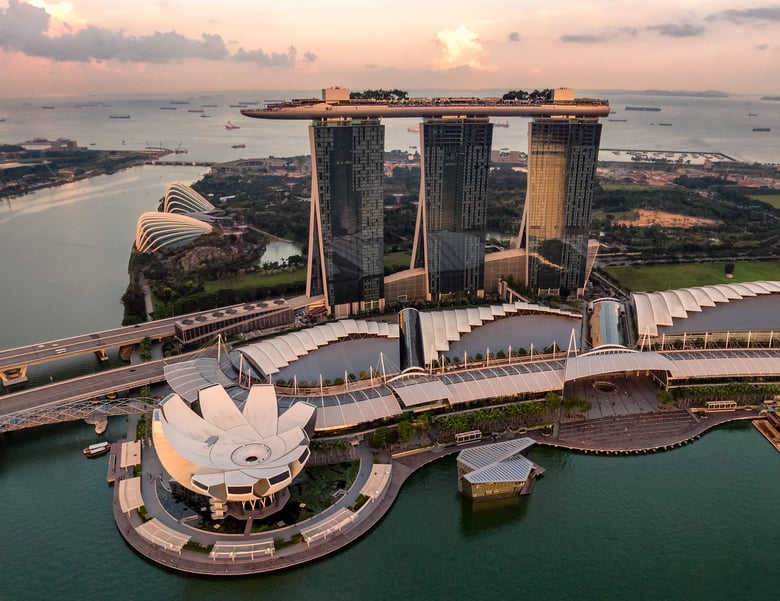“Smart Cities” – there’s a lot of buzz about them right now, and rightly so. Wondering what exactly a smart city is? Let’s look at what makes a smart city, which countries are making the dream a reality, and some of the startups making them possible.
Smart Cities are cities with spaces and infrastructure designed for ease-of-use by most of their citizens, in large part by capitalizing on technologies such as data analytics to do so. Let’s look at cities in perspective: in 1900, 14% of the population lived in urban spaces. In the year 2050, it’s expected that 68% of the population will. So how can we better design our cities to maximise opportunities for economic and social development, while still being sustainable? The answer, of course, is Smart Cities.
Smart Cities are urban areas that are well-connected, where everything from financial transactions to planning journeys is more intuitive and accessible. Think automated, innovative, sustainable and high quality of life. Let’s look at some examples.
Smart Cities Around the World
Investing in the latest technology for an entire urban area sounds expensive. In fact, the benefits of this investment, done well, can generate cost savings and overall economic growth.
Barcelona
The city of Barcelona adopted smart technologies that saved 75 million euros. While automation can spell ‘job loss,’ in Barcelona, the initiative created 47,000 new jobs. They also saved 42.5 million euros in water and raised 36.5 million euros per year in smart car parks. The city’s goal to become, ‘a self-sufficient city of productive neighbourhoods at human speed, inside a hyper-connected zero-emissions metropolitan area’ certainly paid off.
The plan included LED-based street lighting to reduce energy use and related atmospheric heating. The system uses sensors to inform planners of factors such as pollution, temperature, humidity, noise and people flow. Barcelona’s smart bins suck waste into underground storage to reduce the smell of rubbish as well as the noise of waste collection vehicles. This system allows planners to better analyse where waste is generated and respond accordingly. The city incinerates non-recyclable waste as energy for heating systems. The city’s popular share bike scheme and noise centres are all aimed at making the city more liveable.
Singapore
Singapore has been crowned as the smartest city on earth – though it’s a title that can change quickly with the current pace of the Smart Cities movement. Singapore uses smart grid technologies, smart lighting, urban traffic flow IoT technologies, and Wi-Fi access to make the difference. Sensors tell officials when people are smoking in unauthorized zones or throwing rubbish from high-rise buildings. They have a 3-D model enabling city planners to test virtually what evacuations from various neighbourhoods would look like in an emergency. Congestion charges, road sensors, smart parking and phased traffic lights all contribute. Like Barcelona and London, Singapore is working to engage its citizens to generate more Smart City ideas by making the data publicly available and encouraging input.
London
‘Smarter London Together’ is the name of the roadmap intended to make London, ‘the smartest city in the world’. The city hopes to roll-out the latest and greatest AI technologies to make a city that is more liveable and sustainable, without lowing privacy and security standards. They’ll spur innovation from the tech sector through the Civic Innovation Challenge, unroll civic platforms to better engage citizens and communities, and work to address issues of inequality when it comes to access to tech. Free wi-fi in public spaces and 5G connectivity to all areas are also part of the plan. Scientists use a network of wireless sensors to perform air, water quality and ecology tests in London’s Hyde Park.
User-centred designs, open and secure city data, connectivity and smarter streets, data capability for citizens, and smart city collaboration are the foundations for the city’s Smart City vision. Within the healthcare sector, the city plans to bring digital healthcare to all Londoners.
Smart Cities Need Smart Startups
Making Smart Cities happen means supporting smart startups. It’s the sensor, IoT, and data analysis technologies of innovators that make the better management of our urban areas possible. The creation and analysis of networks and data help city planners improve the efficiency and quality of life of urban populations. Startups from the CEE region are creating diverse solutions to help city planners make the Smart City dream a reality.
Ukraine’s Wheelkinetic is a perfect example. They are solving the global smart city problem of last-mile transportation with a proprietary new approach to smart zero-emission urban mobility. Their ultra-compact light electronic vehicle is a revolution in microbility; an ultra-compact city scooter.
Then there’s Ballsquad, a startup from Poland, tackling the outdated management and booking process of public sports facilities in the CEE region. It centralizes the flow of transactions and data between users, public sport facility operators, and public authorities.
Cogzum Bulgaria OOD enables households to run a digital, food-waste free kitchen with next-gen mobile and IoT technology. Curiocity, from Poland, created a geolocation tech that means users are only ever two taps from information about a place or building they’re looking at. It helps users to collect places and memories in their personal gallery and share and discover with their communities.
See Smart City Solutions at 11th Wolves Summit
To be a part of the Smart Cities movement, get to know the technologies making them happen. Wolves Summit is the B2B networking event that supports and propels innovation by linking companies, startups, and investors. The 10th Wolves Summit in October 2019 saw 400 startups and scaleups pitch their disruption to 200 investors, amidst 1,500 participants at the Palace of Culture and Science in Warsaw. Be part of the action by joining the 11th Wolves Summit in March 2020. For more information, learn more here!
LIST OF INNOVATIVE STARTUPS
Get to over 400 top tech startups - download for FREE a complete list
of innovative startups that attended 8th edition of Wolves Summit
-1.webp?width=300&name=book%20(2)-1.webp)




